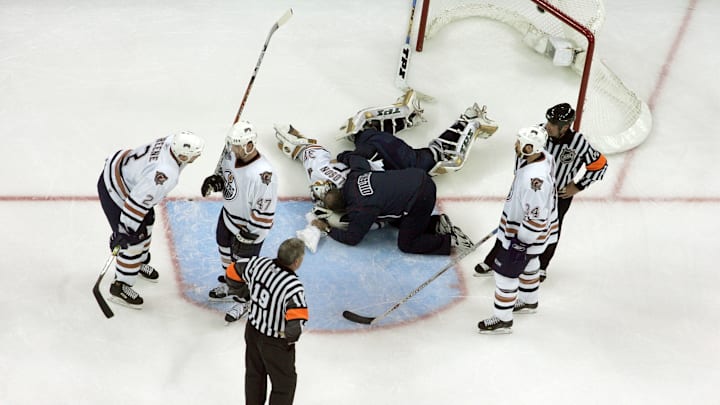With the 20th anniversary of the Carolina Hurricanes' Stanley Cup championship team less than a year away, there's still one shadow that looms large over the 2006 Stanley Cup Final, especially for Oilers fans. Game 1 of the series features one of the biggest "What ifs?" in organization history, casting some doubt over whether the Hurricanes would've been champs.
The series opener between the Hurricanes and the Oilers featured dramatic swings in both directions. Edmonton jumped out to a 3-0 lead in the game before the Hurricanes stormed back for four unanswered goals in just about 13 minutes of gameplay between the second and third periods. The Oilers tied it on the power play with 6:29 left, with the two sides likely heading for overtime.
The complexion of the 2006 Final changed 35 seconds later. A collision between Edmonton goalie Dwayne Roloson and Canes' rookie Andrew Ladd, initiated by Edmonton defender Marc-Andre Bergeron, led to Roloson's injury that kept him out of the series. Ty Conklin relieved him, turning the puck over to Rod Brind'Amour with 31 seconds left and giving the Canes Game 1.
From there, Jussi Markkanen assumed control for the remainder of the series, getting the Oilers to Game 7 before the Hurricanes won their first Stanley Cup. But what if the Roloson collision never happened and he stayed in the net for the rest of the series? Would the outcome be any different? Oilers fans probably think so. I'm not as convinced.
The case for the Edmonton Oilers
Edmonton was doing something that had never been done before. By knocking off the Presidents' Trophy-winning Red Wings in six games, eventual Hart Trophy winner Joe Thornton and the Sharks in the same number of games, and the Mighty Ducks of Anaheim in five, the Oilers became the first 8th seed to reach the Stanley Cup Final.
Dwayne Roloson played a crucial role. After spending most of the season as Manny Fernandez's backup in Minnesota, the 36-year-old netminder was acquired by the Oilers at March's trade deadline for two picks. His 8-7-4 record wasn't great, but Roloson posted a 2.43 GAA the rest of the way to help Edmonton slide into the playoffs.
Once the playoffs began, Roloson was in the zone. While he allowed nearly three goals per game to Detroit, Roloson posted a .929 save percentage in the upset. After falling behind 2-0 with a pair of 2-1 losses to the Sharks, he went on a seven-game winning streak to pull his group within a game of the finals. The Oilers had a ton of momentum heading into the best-of-seven against a tired Canes team.
The best case lies in the ending of Game 1 and the Oilers' response in Game 2. For starters, the turnover leading to Brind'Amour's goal likely doesn't happen with Roloson in the net. The game goes to overtime, making it a toss-up. The Canes came out in Game 2 and blitzed Markkanen for five goals in a 5-0 victory. Maybe Roloson softens the blow, but getting shut out doesn't fall on Markkanen.
Why the Carolina Hurricanes still win the 2006 Stanley Cup
There are two important reasons why the Hurricanes would still defeat the Oilers, regardless of the change in the net. First, Jussi Markkanen had been the Oilers' top goalie for most of the season, getting them into a playoff position. It's not as if he were a third-string goalie coming in without playing this season. He hadn't played during their playoff run, so that's not insignificant.
To his credit, Markkanen played well, too. He didn't allow many bad goals during the series either, conceding 13 in six starts. He allowed five of those 13 in the Game 2 loss when the Hurricanes could do no wrong. It's not his fault his team took nine minor penalties and allowed three power-play goals. He was excellent the rest of the way, giving the Oilers every chance to succeed and win.
The second reason the Hurricanes still win the series is a 21-year-old fellow by the name of Cameron Kenneth Ward. The rookie netminder was incredible during the 2006 Final, showing poise beyond his years. Ward faced 200 shots in seven games, 37 more than all three Edmonton goalies combined, and he allowed two fewer goals (18-16). Edmonton's goalies couldn't do it all.
The Hurricanes could've won the series in Game 5 if not for a bad turnover leading to Fernando Pisani's short-handed overtime-winner to extend the series. The Oilers ran the Canes through the ice in Game 6, but Ward rebounded with his best effort of the series to close it out, making a few signature stops to seal the deal. It's no wonder he won the Conn Smythe Trophy.
I'm sure there are several other arguments you could make for both sides. Ultimately, it doesn't change history. The Hurricanes won the Stanley Cup in 2006. The Oilers had who they had in the net. No amount of speculation changes it, especially not 20 years later. For every good thing Roloson and Markkanen did, Ward was just as good, if not better. That's why the Hurricanes got it done.
